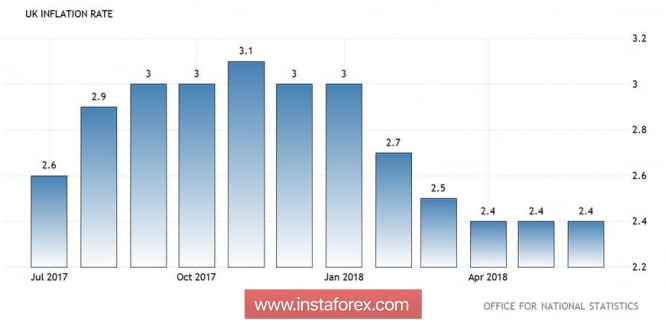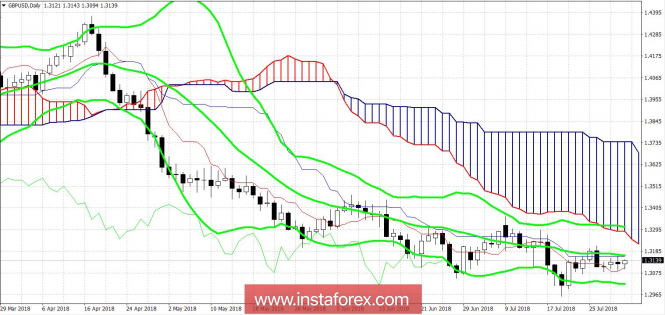The market is almost 100% sure that the Bank of England tomorrow will raise the interest rate by 25 basis points at the end of the August meeting. The alternative scenario is almost not taken into account, despite the increased uncertainty around Brexit and the weaker inflation data for June. Such excessive self-confidence of the market is fraught with consequences if the English regulator decides to postpone the tightening of monetary policy.
Tomorrow, the so-called "super-Thursday" is expected. Within a single day, several important events will take place. The Bank of England meeting, the quarterly inflation report, the monetary policy summary, Mark Carney's press conference, and the PMI data in the UK construction sector . This "news jackpot" is relatively rare, so we are expecting a fairly volatile day.
Let me remind you that the latest data on the growth of British inflation disappointed traders. In June, the consumer price index rose by 2.4% year-on-year with a forecast of growth of 2.6%. Thus, inflation remained at the May level, which is the minimum since the beginning of this year. Strezhevoy index of consumer prices and did a "dive" at a two-percent level, being at around 1.9% (with a growth forecast of 2.2%). In monthly terms, the indicator also did not reach the forecast values, demonstrating a slowdown in growth.

Wage growth rates also leave much to be desired, with a significant strengthening of the labor market, salaries in Britain remain at a six-month low. The disproportion in the growth of inflation and the level of wages testifies to the increase in the cost of living in the country of Foggy Albion, and the rate increase, in turn, will only exacerbate this trend.
Also, one should not forget about the increasing risks of the "hard" Brexit. At the parliamentary hearings on inflation, the head of the Bank of England warned of the extremely negative consequences of such a scenario. In particular, Mark Carney stated that if Britain withdraws from the EU without a deal, then the country will have to rely on the terms of the World Trade Organization. According to Carney, this circumstance will put Britain "in the worst economic situation." The head of the British regulator even allowed the probability that the monetary policy will be revised, and the work of many financial institutions "will be in question."
These were voiced by Mark Carney in mid-July. Since then, the situation with Brexit has not improved. On the contrary, the text of the White Paper rejected by Brussels (the British scenario of further relations between London and Brussels) has put the parties in a difficult situation. Now, Theresa May prepares for the next round of talks, which will be held in mid-August with her personal participation. The fate of the deal largely depends on their success, because in October, the parties must outline the general outline of the future agreement. While at the moment, the key issues (the Irish border, access to a single market, migration problem) have not yet been resolved. It is difficult to predict (or rather, impossible) the outcome of the August talks. On the one hand, Theresa May is somewhat willing to compromise, but, on the other hand, her proposals still put the British in a privileged position, and this fact is quite reasonably disliked by Brussels.
At the same time in London, there is increasing talk about the fact that the parties will not agree on anything. Literally today, the newly-made head of the British Foreign Ministry Jeremy Hunt said that at the moment there is a "high risk of chaotic secession." In his opinion, this will be a big mistake with negative consequences but at the same time, London is allegedly being pushed to such an outcome. Hunt hinted that now, there is a "game of nerves", and Brussels is waiting for the moment when London will cede on key issues. However, in the opinion of the head of the British Foreign Ministry, "this is by no means going to happen." All this suggests that Brexit remains the No. 1 problem for the English regulator. The slowdown in the growth of inflation and the weak dynamics of the level of wages against this background play a secondary role.
What are the arguments in favor of the version about raising the rate at tomorrow's meeting? First, inflationary pressure in the country (despite some decline) allows the regulator to raise the rate by 0.25%. Secondly, after a slowdown in the beginning of the year, the British economy shows moderate growth: according to the latest data, the country's GDP in May grew by 0.3% after the April growth of 0.2%. More "fresh" figures are not available at the moment, as the National Statistical Office of Britain now publishes the corresponding report six weeks after the end of the quarter (earlier, a month later). Thus, the statistical department decided to minimize the number of subsequent amendments and adjustments.
The rhetoric of some representatives of the English regulator also indicates the readiness of the Central Bank to take decisive action. For example, Michael Saunders recently said that the Central Bank may even surprise the markets with a faster increase in interest rates "than is currently expected." True, such a scenario, according to him, is possible only with a smooth and predictable Brexit and provided stable economic growth.
In my opinion, the probability of a rate increase at tomorrow's meeting is very high, but not 100%. This suggests that buying a pound paired with the dollar is now extremely risky. Indeed, if the regulator hesitates, the pound will noticeably weaken all over the market. In addition, the Bank of England may tomorrow lower forecasts for the economy and inflation, thereby exerting pressure on the pound (even with an increase in the interest rate). Rhetoric Mark Carney is unlikely to have a "hawkish" character, given the tone of his speech in Parliament.

All these factors indicate that the pound has a weak chance of a large-scale recovery, despite the high probability of a rate hike. Only the "pigeon" position of Mark Carney, which was voiced by him in the middle of July, can serve as a contrast to the expected rate increase and due to this factor, the growth of GBP / USD is possible in the mid-32nd figure area. All other factors, unfortunately, are not on the side of the British currency. If the regulator shows excessive caution, the pair will return to the annual minimum of 1.2957.
The material has been provided by InstaForex Company - www.instaforex.com